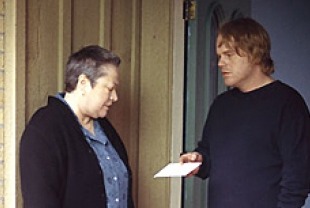Wilson Joel (Philip Seymour Hoffman) works at a high tech firm as a website designer. When his wife commits suicide, he succumbs to a tidal wave of depression, listlessness, and anger. In the opening scenes, he moves slowly as if in a dense fog. He wants to be near the bedroom where he and Liza slept but is unable to get any closer than sleeping on the floor outside the door. At work, he laughs too long at a funny story told by a co-worker and, on cue, his boss, Maura (Sarah Koskoff), suggests that he take some time off. Wilson goes to the beach resort where he and Liza spent their honeymoon but the relaxed setting does not dispel the malaise that has overtaken him.
Like a wounded animal, Wilson wants to hide. He is uncomfortable in the presence of others. He is overpowered by the loss of his wife. The real rub is the letter she left behind for him. Wilson cannot bring himself to read it. Part of the fear is that it will expose something he did wrong that led to her death. Part of it is that it will dash his memories and rewrite the past. He just doesn't want to deal with the letter.
Liza's mother, Mary Ann (Kathy Bates), lives in the same town and she desperately wants to know why her daughter took her own life. She also wonders what she could possibly have done wrong in raising her. Mary Ann keeps intruding on Wilson, and this drives him to seek a numbness that will take away all the feelings. He begins sniffing rags soaked in gasoline. The highs obliterate everything else from his consciousness. To cover the repeated use of gas in his home, Wilson comes up with the hobby of remote control airplanes.
Through Maura, he meets Denny (Jack Kehler) who builds and races model speed boats. Suddenly, Wilson is a boy again savoring some of the simple pleasures. When his boss tells him that she is attracted to him, he quits his job and takes some work offered by Tom Bailey (Stephen Tobolowsky). But that falls through when his new employer stops by and sees Wilson sharing some fuel with two teenage gasoline addicts.
Mourning can be a time of molting, shedding old ways and past habits. Wilson becomes a disheveled hermit, keeping to himself. When he is out in public, he comes across as a crazy person. At a model boat tournament in another city, Wilson jumps into the pond where the contest is being held and earns the ire of the race enthusiasts. While eating pancakes in a restaurant, his model airplane is stolen out of his car. When he asks the owner of the place for the Yellow Pages so he can look up dealers in the area, the proprietor refuses to let him use the copy he has behind the counter. Wilson throws a fit and when he finally gets the book, rips out the pages he needs and storms out of the place. Rebellion and anger are desperate expressions of his process of mourning.
Love Liza with a screenplay by Gordy Hoffman provides a shattering portrait of the many sides of grief. Philip Seymour Hoffman again demonstrates that he is one of America's foremost screen actors. Todd Louiso directs the drama without any flashy gimmicks to take us away from Wilson's plight. In other cultures, it is not uncommon for a widow to mutilate herself after her husband's death. She feels such torment on the outside that relief is sought through counter-pain. In this instance, Wilson stands on a ledge between life and death. There seems to be no way out. But as we read in Ecclesiastes, there is a season for everything, a time to be born and a time to die. There is a bit of both in the scene when Wilson finally reads Liza's suicide letter. Because of all the pain and self-destructiveness that precedes it, the moment is filled with grace and love. It offers him a new beginning.
The DVD edition includes an audio commentary with star Phillip Seymour Hoffman, screenwriter Gordy Hoffman, and director Todd Louiso.
